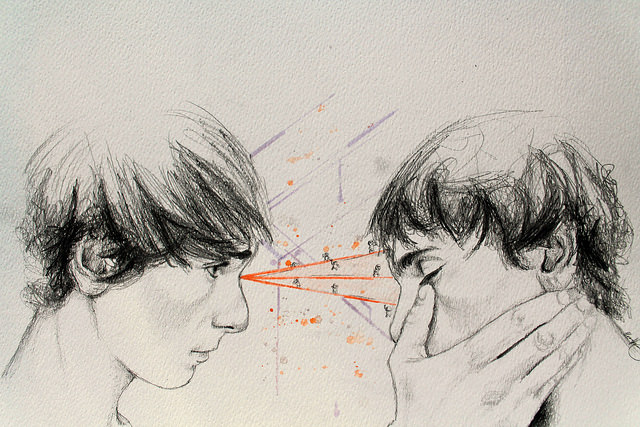I admit it. I like to watch.
When I go to the gym, I watch people. I watch men and women. Elders and youth. The very fit and the barely able. Because it’s a gym I’ve been going to for several years now, I recognize many faces even if I don’t know names, and I recognize new faces.
I also notice the voices that fill my head. They come in many forms. It works like this. I see someone whose physique and hard work in the gym seems so much better than mine, and the voices begin: “You should work harder. You aren’t consistent enough. You really eat too much.” In short: I’m bad.
It works the other way, too: “Wow, he’s really overweight. Does she know that sitting there checking her cell phone won’t do anything for her health? I wonder how old he is. He looks older than me. Yes sir, that’s quite a gut. You know, if you would use less weight you could keep better form. You’re going to hurt yourself doing that.” All of this is happening in my head. I would never say these things out loud. They all come to this: I’m good.
Whether I’m good or bad, the source, the process, and the results are the same. I use other people and make judgments about them which become judgments about myself. With either kind, I cut myself off from the community around me. My fellows are there only to serve the judgments these voices in my head lead me to make.
I’ve come to the conclusion that these voices don’t belong to me.
I am also pretty clear that I did not come into the world knowing how to use people as something against which to measure my worth or lack of it. I had to learn how to do that, and apparently I learned it well. I took on those voices that said “compare yourself to that one.” I am not alone. I’ve met too many of my fellows who hear the same voices that I do. Traditional educational approaches measure students against students (it’s called the bell curve formally). Political institutions thrive on our candidate being better than their candidate. Religious and moral systems often calculate ethics based on ethical principles which immediately are personified by villainous or righteous exemplars. The voices are many which teach us to “compare yourself to that one.”
I didn’t like being that way in the world, even if it seemed to happen largely in my head. I am persuaded by the adage that thoughts become actions, things and relationships, so ultimately, they don’t just remain in my head.
I have developed a practice that I first started using in the gym, but it’s portable! You can take it anywhere. It silences the voices (and, I maintain, helps send them back to where they came from). It begins a healing process for my soul long damaged by this incessant need to slice and judge.
Here’s how it works.
I go into the gym for my workout, and I watch other people, like always. In this practice, however, I choose to bring my watching eyes on everyone in the gym, one person at a time. I move around the gym for my workout, and bring my gaze to each person I encounter. Doesn’t matter who they are: male, female, younger, elder, abled, disabled, dressed well or oddly. Nothing matters but this. I bring my gaze to them, and inside myself I address the person and say: “Thank you for your beauty.”
Then, I wait.
Just a fraction of a second, usually, and whatever voice was already launching itself inside of me vanishes. Instead, I see something in this other person that I had not seen before. The seeing might feel like a warmth. It might feel like a little smile. Sometimes, honestly without any explanation that I can give you, I feel a surge of emotion and tears forming in my eyes. Not what I came to the gym for! I didn’t come to the gym to exercise my ability to slice and judge, either. I’ll take an occasional tear and pretend it’s sweat I’m wiping out of my eyes.
Yes, I’ll take the occasional tear, because within it or any other feeling that comes to me after I salute another’s beauty is a secondary feeling—that I belong a little bit to that person now. They are my people. I am their people. We are the tribe of gym-goers. All of us. I have not measured this last thing, but I enjoy it. When I choose to engage this practice of saluting the beauty of others, I swear I lift better and run lighter. I know I smile more.
When I choose this practice, the voice inside of me saying “thank you for your beauty” to the teenager on the cell phone, to the man from the rehab center, to the small frail looking woman, to the bronzed body-builder, is my voice, the one I came into the world with.
This little practice has turned a saying of Jesus around for me. Whatever I do to others (even if it’s all in my head), I do to myself. From under the Bodhi Tree, I can see the Buddha, who taught that there is no separate self, smiling.
Author: Robert Patrick
Editor: Catherine Monkman
Image: lucahennig/flickr










Read 29 comments and reply